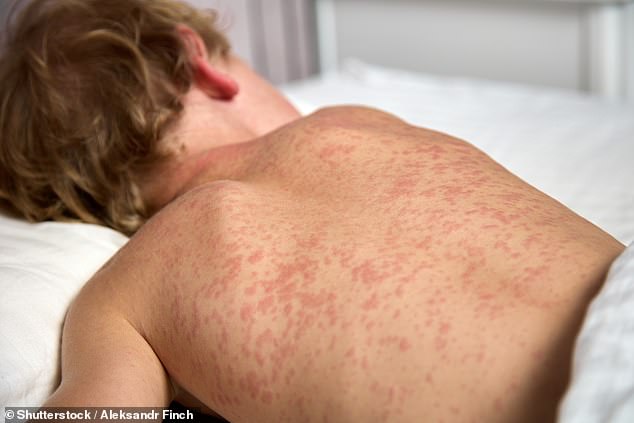A single dose of the measles jab is two-and-a-half times more likely to be completely ineffective in children born by caesarean section, a study suggests.
Experts found that 12 per cent of children born via C-section had no immune response to their first measles, mumps and rubella (MMR) vaccination, compared with 5 per cent of normally delivered children.
The findings have prompted warnings over children who only receive the first dose of the jab, which is usually given on the NHS to babies aged between 12 and 13 months.
The second dose is typically administered to children aged between three years four months and five years old.
But data shows only 85 per cent of children have had both doses by the age of five, which is below the 95 per cent needed to stop the disease spreading.
Experts found that 12 per cent of children born via C-section had no immune response to their first (MMR) vaccination, compared with 5 per cent of normally delivered children (Stock image)
Researchers from Cambridge University and Fudan University in China examined data for 1,505 children.
The researchers said C-section births were ‘linked with 2.56 increased odds of primary vaccine failure’ compared to babies born naturally.
However, C-section children who had a second dose of the measles jab had robust immunity against the disease.
The study suggests the lack of immunity in C-section children is linked to the development of a baby’s gut microbiome, which is microbes that naturally live inside the gut.
Other studies have shown that a vaginal birth transfers more varied microbes from mother to baby, which can boost the immune system.
Professor Henrik Salje, joint senior author of the study, said: ‘With a C-section birth, children aren’t exposed to the mother’s microbiome in the same way.
‘We think this means they take longer to catch up in developing their gut microbiome, and with it, the ability of the immune system to be primed by vaccines against diseases including measles.
The first dose of the jab, is usually given to babies aged between 12 and 13 months. The second dose is given to children aged between three years four months and five years old (Stock image)
‘Infants born by C-section are the ones we really want to be following up to make sure they get their second measles jab, because their first jab is much more likely to fail.’ Professor Salje added that ‘measles is top of the list of diseases we’re worried about because it’s so infectious’.
Dr Mary Ramsay, director for immunisation at the UK Health Security Agency (UKHSA), said: ‘Our evidence suggests that two doses of the vaccine are highly protective, and the majority of cases we see are in unvaccinated children.’
Adam Finn, professor of paediatrics at the University of Bristol, said the research ‘raises important questions that need to be researched further’.
The study was published in the journal Nature Microbiology.
Source: Mail Online
